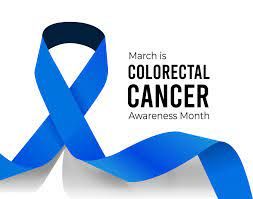
Colorectal Cancer Awareness
To many people, colon or colorectal cancer seems like a disease that only happens to older people. However, the medical community has cause for alarm regarding the increasing number of adults under 45 who develop the disease.
If you are under 50 and think you can wait to screen for colon cancer, think again. Rates of colorectal cancer are on the rise, and more young adults are getting diagnosed when the disease is in its advanced stages. Here is what you should know about colorectal cancer, the importance of screening, and how to reduce your risk.
Colorectal Cancer and Young Adults
This year in the U.S., about 20,000 adults under 50 will get a colon cancer diagnosis, and experts estimate that 3,750 will die from this disease. Colorectal cancer is one of the deadliest cancers for people under 50, probably because it is often advanced when detected. According to a 2021 study in the Journal of the American Medical Association (JAMA), colorectal cancer is on track to become the number-one cause of death among adults aged 20-49.
Colon cancer diagnoses are on the rise among younger adults. Since the 1990s, cases among adults under 50 have risen by about 50%. The American Cancer Society reports that between 1995 and 2019, cases among people under 55 increased from 11% to 20%. Moreover, individuals born after 1990 are twice as likely as people born in 1950 to get colorectal cancer.
Researchers have identified some factors contributing to the rise in colon cancer in younger adults, some diet related. For example, women consuming more than two sugary beverages per day double their risk of early-stage colorectal cancer. This increased risk also tends to occur among individuals eating more processed meats and meals and fewer fresh foods and produce.
Other lifestyle trends may also contribute to these increased rates. Younger adults are engaging in more sedentary behaviors and experiencing higher levels of obesity. However, not all causes are clear to scientists, who continue investigating the impact of other factors like antibiotics, plastics, and environmental toxins. Genetics may also play a role, but family history only accounts for about 20% of colorectal cancer cases in this age group.
Colorectal Cancer Screening
Since 2018, the American Cancer Society has recommended that adults start screening for colon cancer at age 45. Before then, the minimum age was 50. If you have not yet hit 50 and are waiting until then to schedule your colorectal screening, you might want to start earlier.
A standard screening method is a colonoscopy, which involves inserting a tiny camera into the rectum and colon that looks for polyps and signs of cancer. People who get a colonoscopy should repeat screenings every 10 years if they do not have elevated risks for colorectal cancer.
If you feel uneasy about getting a colonoscopy, consider asking your provider about the less invasive sigmoidoscopy. This procedure involves inserting a tube and camera into the rectum and lower third of the colon. A sigmoidoscopy should be repeated every five years for people with normal risk levels.
Another option is a fecal-immunochemical test (FIT), which detects blood in the stool sample. You can do the FIT test at home, and you should repeat it every year. Another type of take-home test is a stool DNA test, such as Cologuard. This screening detects blood and changes in your DNA from cancer cells or precancerous polyps. People with a normal risk for colon cancer should take this test every three years.
The kind of colon cancer screening you choose depends on several factors:
- Your health or medical condition
- Whether you have a family history of colorectal cancer or polyps
- Your risk factors for colorectal cancer
- Your preferences
- The screening you are able or likely to complete
If you are unsure which type of screening is right for you, talk to your doctor to weigh the pros and cons of each test. If you choose a test other than a colonoscopy and the results are positive for polyps or precancerous cells, your physician will order a colonoscopy as a follow-up.
Cancer Warning Signs and Prevention
Although not all colon cancer diagnoses may be preventable, you can do several things to reduce your risk. This type of cancer has strong links to lifestyle and diet. Avoiding or limiting excessive sugars and processed foods and eating a Mediterranean dietcan reduce your risk. Also, people who have already had colon cancer can prevent it from reoccurring through healthy eating.
Knowing the early symptoms of colorectal cancer is vital to effective treatment and preventing reoccurrences. Common warning signs include:
- Blood in the stool
- Changes in bowel movements
- Increased fatigue
- Feeling full or bloated
- Unexplained weight loss
If you experience any of these symptoms, see your doctor as soon as possible to get screened.
Talk to family members about known cases of colon cancer. Ask your parents or siblings if they have been diagnosed or found polyps or precancerous cells during screenings. If you have parents, siblings, or children who have had colorectal cancer, you should consider starting to get screened 10 years earlier than the age of the family member who was diagnosed. Your doctor will also want to know if you have a family history of colon cancer.
Research and materials for this article were compiled, written, and distributed on behalf of the National Public Health Information Coalition. The views and opinions expressed in this blog are those of the various authors and do not necessarily reflect the official policy or position of the National Public Health Information Coalition or its members.
References
https://jamanetwork.com/journals/jamanetworkopen/fullarticle/2778204
https://www.nbcnews.com/health/cancer/colon-cancer-advanced-younger-symptoms-rcna72983
https://acsjournals.onlinelibrary.wiley.com/doi/full/10.3322/caac.21772
https://academic.oup.com/jnci/article/109/8/djw322/3053481?login=false
https://www.health.harvard.edu/cancer/drinking-sugary-beverages-associated-with-colon-cancer-risk
https://www.thelancet.com/journals/lanplh/article/PIIS2542-5196(23)00021-9/fulltext
https://www.michiganmedicine.org/health-lab/1-5-young-colon-cancer-patients-have-genetic-link
https://medlineplus.gov/ency/patientinstructions/000704.htm

